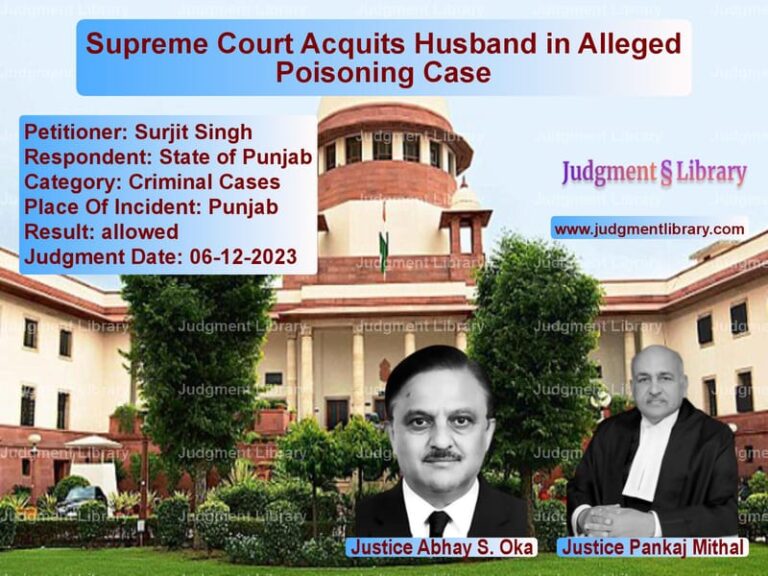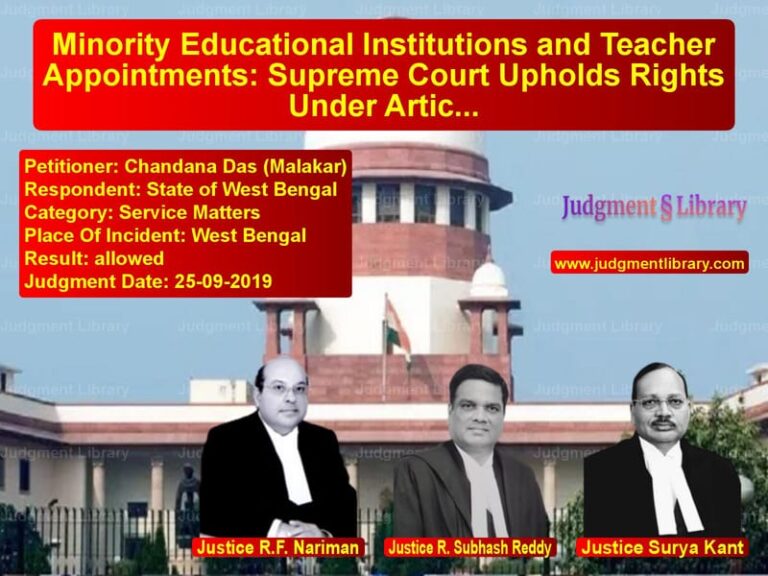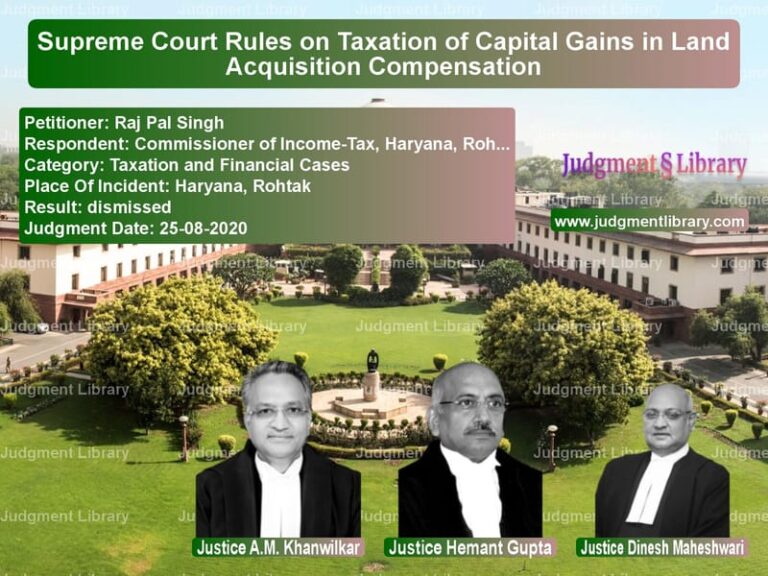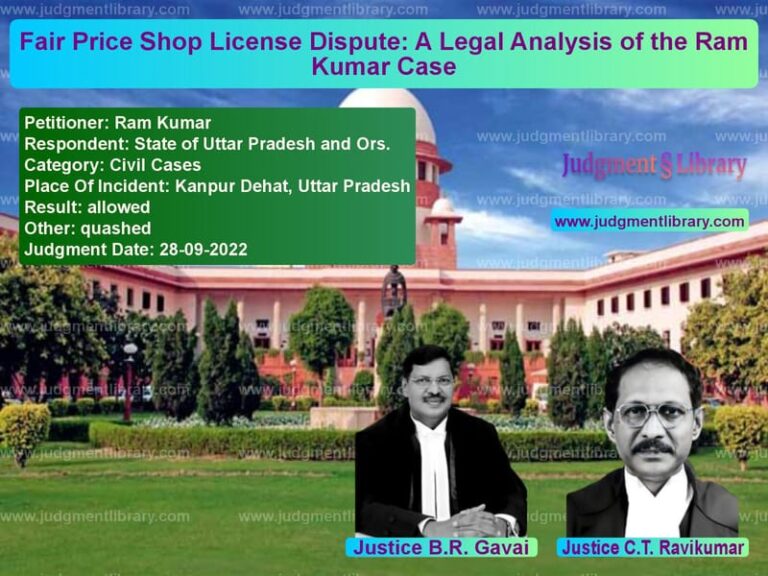Pre-emption Rights Under Rajasthan Law: Supreme Court Clarifies Limitation Period
The case of Raghunath (D) by LRs v. Radha Mohan (D) through LRs & Ors. revolves around the legal question of whether the limitation period for claiming a right of pre-emption begins from the first sale after the enactment of the Rajasthan Pre-Emption Act, 1966 or from subsequent sales. The Supreme Court examined the legal framework governing pre-emption rights and clarified the applicability of the Limitation Act, 1963 to such claims.
Background of the Case
The dispute arose when the original plaintiff sought to enforce a right of pre-emption after three sale transactions had already taken place concerning the property. The sales occurred in 1945, 1946, and 1966, with the last transaction happening on November 5, 1966, after the Rajasthan Pre-Emption Act came into force.
The plaintiff’s suit, filed in 1974, was for pre-emption over a sale transaction dated January 21, 1974. The defendant resisted the claim, arguing that it was barred by limitation because the right of pre-emption should have been exercised after the first sale following the enactment of the 1966 Act.
Legal Issues Raised
The key legal questions before the Supreme Court were:
- Does the limitation period for enforcing pre-emption rights begin from the first sale deed after the enactment of the Rajasthan Pre-Emption Act, 1966?
- Can a pre-emptor exercise the right of pre-emption over multiple successive sales?
- What is the correct interpretation of Article 97 of the Limitation Act, 1963 in relation to pre-emption rights?
Petitioner’s Arguments
The petitioner argued that:
- The plaintiff had waived his right of pre-emption by failing to enforce it during earlier sales.
- The purpose of pre-emption is to prevent outsiders from acquiring property in a specific locality or community, and once waived, it cannot be revived.
- Each sale does not give rise to a fresh cause of action for pre-emption.
Respondent’s Arguments
The respondent countered by stating:
- Under Section 8 of the Rajasthan Pre-Emption Act, 1966, each sale creates a fresh opportunity to enforce pre-emption rights.
- The limitation for filing a suit should be determined based on the latest sale and not previous transactions.
- There is no statutory bar preventing a plaintiff from exercising pre-emption rights on multiple occasions.
Supreme Court’s Analysis
1. Nature of the Right of Pre-emption
The Supreme Court discussed the origin and purpose of pre-emption laws, citing the judgment in Barasat Eye Hospital v. Kaustabh Mondal. The Court observed:
“The right of pre-emption is not a right to the property itself but a right to be substituted in place of the buyer. It is based on social considerations to prevent strangers from entering a particular community or locality.”
2. Limitation Period for Pre-emption Claims
The Court examined Article 97 of the Limitation Act, 1963, which states that the limitation period for enforcing a right of pre-emption is one year from the date the purchaser takes possession or the sale deed is registered. The Court clarified:
“The right of pre-emption must be exercised at the first available opportunity. If a pre-emptor does not assert his right in the earliest sale, he cannot later challenge subsequent transactions involving the same property.”
3. Loss of Right Due to Waiver
The Court emphasized that pre-emption is a “weak right” that can be defeated through legitimate means, including waiver. It referred to the case of Indira Bai v. Nand Kishore, where it was held that:
“If a pre-emptor does not exercise his right when the property is first sold, he loses the right permanently and cannot claim pre-emption in subsequent sales.”
4. The Effect of Section 9 of the Rajasthan Pre-Emption Act, 1966
The Court examined Section 9, which deals with the loss of pre-emption rights, and concluded:
“Once the right is waived in an earlier transaction, it cannot be revived for a subsequent sale. Allowing repeated claims would create perpetual uncertainty for buyers.”
Final Judgment
The Supreme Court allowed the appeal and held that the plaintiff’s suit was barred by limitation. The key points in the ruling were:
- The limitation period for pre-emption begins with the first sale after the enactment of the Rajasthan Pre-Emption Act, 1966.
- Pre-emption is a one-time right, and failure to exercise it at the earliest opportunity constitutes waiver.
- Subsequent sales do not create fresh causes of action for pre-emption.
Impact of the Judgment
This ruling provides clarity on pre-emption rights and their limitation period, ensuring:
- Buyers have legal certainty about their property transactions.
- Pre-emptors cannot repeatedly claim rights over the same property.
- Legal disputes over pre-emption are resolved efficiently without prolonged litigation.
The judgment reinforces the principle that pre-emption must be exercised promptly, preventing abuse of the right to disrupt property transactions.
Petitioner Name: Raghunath (D) by LRs.Respondent Name: Radha Mohan (D) through LRs & Ors..Judgment By: Justice Sanjay Kishan Kaul, Justice Aniruddha Bose, Justice Krishna Murari.Place Of Incident: Ajmer, Rajasthan.Judgment Date: 13-10-2020.
Don’t miss out on the full details! Download the complete judgment in PDF format below and gain valuable insights instantly!
Download Judgment: Raghunath (D) by LRs vs Radha Mohan (D) thro Supreme Court of India Judgment Dated 13-10-2020.pdf
Direct Downlaod Judgment: Direct downlaod this Judgment
See all petitions in Property Disputes
See all petitions in Succession and Wills
See all petitions in Judgment by Sanjay Kishan Kaul
See all petitions in Judgment by Aniruddha Bose
See all petitions in Judgment by Krishna Murari
See all petitions in allowed
See all petitions in supreme court of India judgments October 2020
See all petitions in 2020 judgments
See all posts in Civil Cases Category
See all allowed petitions in Civil Cases Category
See all Dismissed petitions in Civil Cases Category
See all partially allowed petitions in Civil Cases Category







